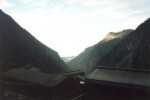 The mill area is where Freeport
breaks rock (ore) into a fine sand. Breaking the rock into sand
allows the workers to separate the valuable copper and gold mineral
grains from the rest of the common rock-forming minerals such as
feldspar and quartz. The process of breaking rock into sand is
called milling and
the process of separating out the valuable mineral grains is called concentration. The mill area is where Freeport
breaks rock (ore) into a fine sand. Breaking the rock into sand
allows the workers to separate the valuable copper and gold mineral
grains from the rest of the common rock-forming minerals such as
feldspar and quartz. The process of breaking rock into sand is
called milling and
the process of separating out the valuable mineral grains is called concentration.
|
 The
mill is more than a thousand feet lower than the mine. The ore is
transferred from the mine to the mill by dropping the rock down a big
chute carved into the rock. Gravity does a lot of the work -
imagine dropping rocks off a 100 story tall building! The
mill is more than a thousand feet lower than the mine. The ore is
transferred from the mine to the mill by dropping the rock down a big
chute carved into the rock. Gravity does a lot of the work -
imagine dropping rocks off a 100 story tall building! |
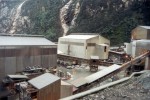 After
the ore falls down the chute, it is shipped by underground conveyor
belts to the
mill. There are a few different kinds of mills, but they all work
on the same basic principle. Most of the mills are large, hollow,
steel cylinders tilted on their side like a big log floating on a
river. They put ore rock inside the cylinders, along with some
very hard, steel cannon balls, and then spin the cylinder. The
cannon balls bounce around and smash the rock into sand. After
the ore falls down the chute, it is shipped by underground conveyor
belts to the
mill. There are a few different kinds of mills, but they all work
on the same basic principle. Most of the mills are large, hollow,
steel cylinders tilted on their side like a big log floating on a
river. They put ore rock inside the cylinders, along with some
very hard, steel cannon balls, and then spin the cylinder. The
cannon balls bounce around and smash the rock into sand. |
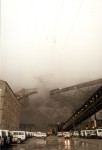 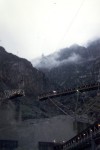 These
conveyor belts are stacking ground up rock for processing. Some
of the pieces are fist sized because they've only been through the
primary crushing process. Other piles are of finer-grained
material. These
conveyor belts are stacking ground up rock for processing. Some
of the pieces are fist sized because they've only been through the
primary crushing process. Other piles are of finer-grained
material. |
| The company then pours
the ground-up rock sand into big vats that contain a special liquid
that causes the valuable minerals to float to the top and spill out,
like a beer that is poured too quickly spilling out over the lip of the
glass. The sand made of valuable minerals is called concentrate and
is transported down to the sea to be shipped to a smelter. The
sand made of worthless common minerals is called tailings and is
dumped into a river designated for slurrying the tailings to the flat
lowlands. |
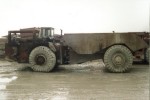 This is a photograph of an
underground haul truck. It's mainly used for moving small amounts
of rock here and there. Note how it bends in the middle, allowing
it to turn tight corners in narrow tunnels. In a smaller
operation, miners might use haul trucks to move ore to the ore chute to
the mill. The mine here, however, is much bigger scale and
designed so that gravity breaks the rock and the rock naturally falls into the ore train
(a process called block
caving). This is a photograph of an
underground haul truck. It's mainly used for moving small amounts
of rock here and there. Note how it bends in the middle, allowing
it to turn tight corners in narrow tunnels. In a smaller
operation, miners might use haul trucks to move ore to the ore chute to
the mill. The mine here, however, is much bigger scale and
designed so that gravity breaks the rock and the rock naturally falls into the ore train
(a process called block
caving). |
 The mill area is where Freeport
breaks rock (ore) into a fine sand. Breaking the rock into sand
allows the workers to separate the valuable copper and gold mineral
grains from the rest of the common rock-forming minerals such as
feldspar and quartz. The process of breaking rock into sand is
called milling and
the process of separating out the valuable mineral grains is called concentration.
The mill area is where Freeport
breaks rock (ore) into a fine sand. Breaking the rock into sand
allows the workers to separate the valuable copper and gold mineral
grains from the rest of the common rock-forming minerals such as
feldspar and quartz. The process of breaking rock into sand is
called milling and
the process of separating out the valuable mineral grains is called concentration.
 The
mill is more than a thousand feet lower than the mine. The ore is
transferred from the mine to the mill by dropping the rock down a big
chute carved into the rock. Gravity does a lot of the work -
imagine dropping rocks off a 100 story tall building!
The
mill is more than a thousand feet lower than the mine. The ore is
transferred from the mine to the mill by dropping the rock down a big
chute carved into the rock. Gravity does a lot of the work -
imagine dropping rocks off a 100 story tall building! After
the ore falls down the chute, it is shipped by underground conveyor
belts to the
mill. There are a few different kinds of mills, but they all work
on the same basic principle. Most of the mills are large, hollow,
steel cylinders tilted on their side like a big log floating on a
river. They put ore rock inside the cylinders, along with some
very hard, steel cannon balls, and then spin the cylinder. The
cannon balls bounce around and smash the rock into sand.
After
the ore falls down the chute, it is shipped by underground conveyor
belts to the
mill. There are a few different kinds of mills, but they all work
on the same basic principle. Most of the mills are large, hollow,
steel cylinders tilted on their side like a big log floating on a
river. They put ore rock inside the cylinders, along with some
very hard, steel cannon balls, and then spin the cylinder. The
cannon balls bounce around and smash the rock into sand. 
 These
conveyor belts are stacking ground up rock for processing. Some
of the pieces are fist sized because they've only been through the
primary crushing process. Other piles are of finer-grained
material.
These
conveyor belts are stacking ground up rock for processing. Some
of the pieces are fist sized because they've only been through the
primary crushing process. Other piles are of finer-grained
material. This is a photograph of an
underground haul truck. It's mainly used for moving small amounts
of rock here and there. Note how it bends in the middle, allowing
it to turn tight corners in narrow tunnels. In a smaller
operation, miners might use haul trucks to move ore to the ore chute to
the mill. The mine here, however, is much bigger scale and
designed so that gravity breaks the rock and the rock naturally falls into the ore train
(a process called block
caving).
This is a photograph of an
underground haul truck. It's mainly used for moving small amounts
of rock here and there. Note how it bends in the middle, allowing
it to turn tight corners in narrow tunnels. In a smaller
operation, miners might use haul trucks to move ore to the ore chute to
the mill. The mine here, however, is much bigger scale and
designed so that gravity breaks the rock and the rock naturally falls into the ore train
(a process called block
caving).
